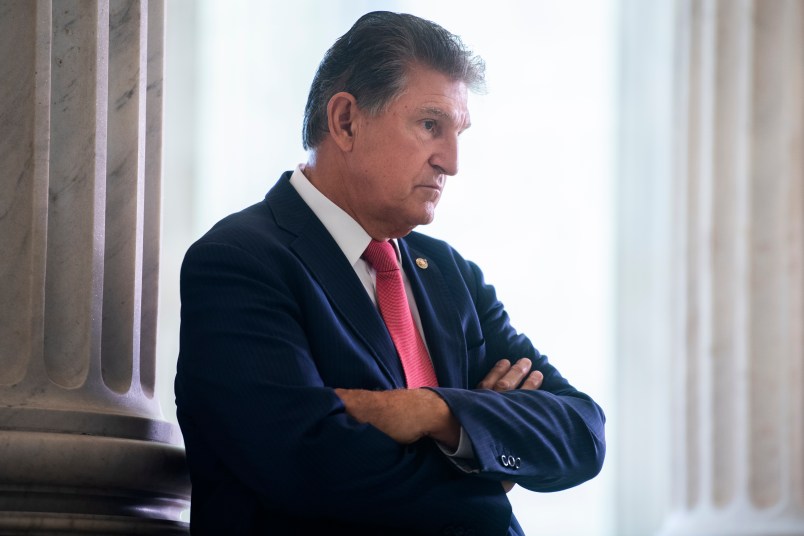Sen. Joe Manchin (D-WV) on Thursday isolated specific parts of S1, the “For The People Act” voting rights package, that he said he thinks can garner bipartisan support.
They include expanding the early voting period, getting more resources to historically disenfranchised groups, beefing up election security infrastructure and tightening up campaign finance laws.
“Pushing through legislation of this magnitude on a partisan basis may garner short-term benefits, but will inevitably only exacerbate the distrust that millions of Americans harbor against the U.S. government,” he wrote.
He did not mention other high priority measures for Democrats in the bill, including redistricting commissions to deal with partisan gerrymandering, re-enfranchising felons and public financing for campaigns.
Manchin, jokingly called the Senate majority leader due to his outsized power in the evenly-split chamber, brings that influence to this bill as well. He is currently the only Democrat who hasn’t co-sponsored S1, and his apparent inclination to attract Republican support for parts of it seems to already be shaping Democratic leadership’s public comments.
“I’ve spoken to some Republican senators who don’t accept the bill as one in its entirety but may be willing to sit down and talk about sections of this bill,” Senate Majority Whip Dick Durbin (D-IL) said on CNN Thursday morning.
Durbin added that it’s an “active discussion” within the caucus about potentially reforming the filibuster to get the voting rights package through, and that “we’re still talking to Joe” about it, referring to Manchin.
Changing the filibuster for the sake of S1 only makes sense if Democrats have the 50 votes (plus Vice President Kamala Harris) to ultimately pass it. If Manchin refuses to play ball without Republican support, Democrats will likely need to save that battle for another bill.
Whittling down the sweeping legislation, though, may antagonize progressives and advocates alike who see the bill as a critical stopgap to the rampant voter suppression and disenfranchisement coming out of GOP statehouses across the country.
Both Manchin and Durbin have a rosier view of potential bipartisan cooperation on the bill than was on display at the Wednesday Senate Rules committee hearing, the first this bill has had. Then, not only did Republicans express little support for the legislation, but they also refused to even acknowledge the existence of the nationwide surge of state-level voter restrictions that, for Democrats, has underscored the bill’s importance.
“States are not engaging in trying to suppress voters whatsoever,” Senate Minority Leader Mitch McConnell (R-KY) said during an unusual appearance at the hearing.
The Brennan Center for Justice is currently tracking 253 bills that would restrict voting rights across 43 states. Republicans had an answer for that, too, with Ranking Member Roy Blunt (R-MO) dismissing the figure by saying that most of those bills won’t become law.
Many Republicans brought up potential implementation problems with new standards and timelines in the bill, a concern Manchin cited in his statement as well.
Sen. Ted Cruz (R-TX), representing the hard right wing of the caucus, wildly claimed that the bill would promote “widespread voter fraud” and was designed to keep “corrupt” politicians — read: Democrats — in power for “100 years.”
The bid for bipartisanship on the voting rights bill, though, may just be the opening salvo to a process that will conclude with filibuster reform. Many Democrats have suggested that it’ll take seeing Republican obstruction in action to push the caucus over the tipping point and into the land of reform.
Sen. Chuck Schumer (D-NY) reiterated what’s become his mantra on the voting rights legislation Thursday morning, while he told reporters that Republican cooperation was preferred, but not required, for Democrats to pass their ambitious legislative agenda. “Failure is not an option,” he said.
At least so far though, Manchin has expressed opposition to the long game, telling CNN that he will not cave on lowering the 60-vote threshold even if Republicans block S1.







I’m in favor of some well-timed corruption here. What’s this man’s price?
What is most important to remember is a bill being passed by and signed into law is only the first step of enforcing a voting rights act. There is always the Supreme Court.
Remember, the only reason we are were we are in regard to this issue is Chief Injustice of the Supreme Court John Roberts declaring discrimination no longer exists gutted the last voting rights act passed with near unanimous consent in both Houses of Congress.
Therefore, what needs to be remembered is that passing a voting rights act may not be the end. We may be back at square one needing to end the filibuster so that other than Republican justices who care nothing for the constitution, democracy or their oaths of office will no longer control what is deemed constitutional and that a voting rights act will become the law of the land.
So, just STFU, Joe. And go get the damn votes, if it’s so important to you.
Manchin’s list of provisions he can support isn’t half bad, but it also needs the mail-in ballot provisions. I read Manchin as saying that if he can’t get a single Repub vote for that, he’ll vote for it anyway and give Harris the tiebreaker.
The progressives are going to have to confront reality. If they won’t support a bill that’s less than perfect from their perspective, they get nothing. That’s the art of legislating, isn’t it?
This. Stop talking about it, Joe, and do something constructive. Find out what your buddies on the other side of the aisle say they’ll support. Nail them to public commitments. Otherwise, yes, just STFU.